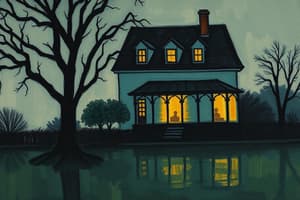Podcast
Questions and Answers
What was the Stamp Act?
What was the Stamp Act?
- A tax on exporting goods from the colonies to Britain
- A ban on importing British goods to the colonies
- A law requiring all official documents to bear a stamp
- A revenue-raising measure that directly taxed the colonists (correct)
How did the established Virginia gentlemen react to the Stamp Act?
How did the established Virginia gentlemen react to the Stamp Act?
- They openly revolted against British rule
- They grumbled but remained loyal patriots (correct)
- They actively protested and boycotted British goods
- They supported the Stamp Act as a necessary measure
Who objected to the Stamp Act on principle?
Who objected to the Stamp Act on principle?
- The younger members of the House of Burgesses (correct)
- The British Parliament
- The established Virginia gentlemen
- The colonists who were directly taxed
What was the basis for the colonists' objection to the Stamp Act?
What was the basis for the colonists' objection to the Stamp Act?
What did John Locke and other Enlightenment thinkers propose?
What did John Locke and other Enlightenment thinkers propose?
Where did Tom and John Tyler observe the legislative proceedings?
Where did Tom and John Tyler observe the legislative proceedings?
Why did the younger members of the House of Burgesses object to the Stamp Act?
Why did the younger members of the House of Burgesses object to the Stamp Act?
What was the best vantage point for interested observers to watch the legislative proceedings?
What was the best vantage point for interested observers to watch the legislative proceedings?
How did John Locke and other Enlightenment thinkers view government?
How did John Locke and other Enlightenment thinkers view government?
What role did Tom play during the legislative proceedings?
What role did Tom play during the legislative proceedings?
What was the main reason for the colonists' outrage at the Stamp Act?
What was the main reason for the colonists' outrage at the Stamp Act?
How did the more conservative members of the House of Burgesses refer to the younger objectors of the Stamp Act?
How did the more conservative members of the House of Burgesses refer to the younger objectors of the Stamp Act?
Flashcards are hidden until you start studying
Study Notes
The Stamp Act
- Enacted in 1765, it was a British law imposing direct taxes on the colonies through printed materials requiring a stamp.
- Aimed to raise revenue for British troops stationed in North America.
Reaction of Virginia Gentlemen
- Established Virginia gentlemen viewed the Stamp Act as a direct infringement on their rights and liberties.
- Many expressed vocal disapproval, organizing resistance and promoting colonial unity against perceived injustice.
Principle-Based Objection
- Some colonists objected on the principle of taxation without representation, arguing they could not be taxed by a parliament in which they had no voice.
Basis for Colonial Objection
- Colonists believed that only their own colonial legislatures had the authority to impose such taxes.
- The Act was perceived as a violation of their rights as Englishmen.
Proposals of Enlightenment Thinkers
- John Locke and other Enlightenment figures espoused the idea of government as a social contract, where power derives from the consent of the governed.
- They argued for natural rights, including life, liberty, and property.
Location of Observations
- Tom and John Tyler observed legislative proceedings from the House of Burgesses in Virginia.
- This location provided access to the debates and discussions surrounding the Stamp Act.
Younger Members' Objections
- Younger members of the House of Burgesses were particularly passionate against the Stamp Act, seeing it as an encroachment on colonial rights.
- They preferred to take a firm stand, unlike some of the more established members.
Vantage Point for Observers
- Galleries in the House of Burgesses offered the best vantage point for interested observers to watch legislative proceedings.
- This setting allowed many to witness the debates firsthand.
Government Views by Locke and Enlightenment Thinkers
- Locke and contemporaries viewed government as a necessary institution to protect individual rights, with authority needing to be earned through popular consent.
- They believed in limited government to prevent tyranny.
Role of Tom Tyler
- Tom Tyler played an active role in the legislative discussions, advocating against the Stamp Act and rallying support among his peers.
- He represented the younger generation's progressive stance on colonial matters.
Main Colonists' Outrage
- The primary outrage stemmed from the imposition of the Stamp Act without the consensus or representation of colonial assemblies.
- Colonists felt their autonomy and rights as English subjects were under threat.
Conservative Members' Terminology
- More conservative members of the House of Burgesses referred to the younger objectors as "young hotheads."
- This label underscored a divide in strategies and attitudes towards resistance against British policies.
Studying That Suits You
Use AI to generate personalized quizzes and flashcards to suit your learning preferences.




